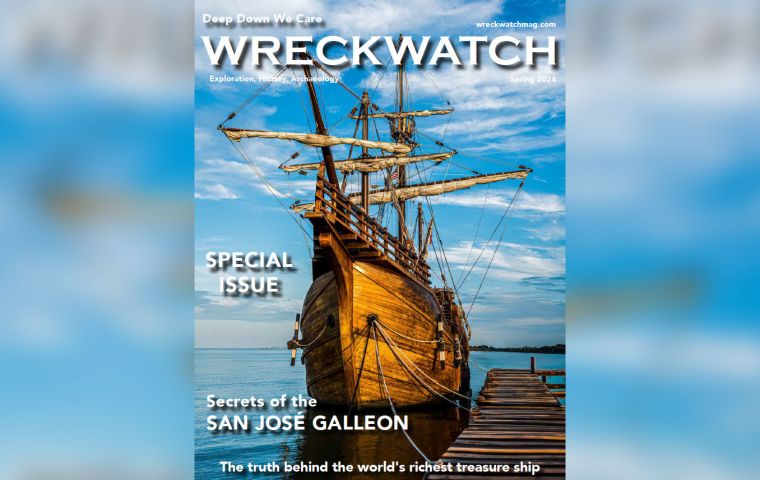MercoPress. South Atlantic News Agency
Wreckwatch Magazine special issue calls for 'decolonization' of San José treasure ship
 Secrets of the San José Galleon, a Wreckwatch magazine special, is published on Saturday 20 April 2024. It is available for free from www.wreckwatchmag.com.
Secrets of the San José Galleon, a Wreckwatch magazine special, is published on Saturday 20 April 2024. It is available for free from www.wreckwatchmag.com. Wreckwatch, the foremost publication dedicated to maritime archaeology, has released a groundbreaking special issue shedding light on the controversial history and future of the San José, a Spanish galleon lost off the coast of Cartagena, Colombia, in 1708.
The magazine's in-depth investigation delves into the complexities surrounding the San José, valued at $17 billion, which has become a focal point of debate regarding ownership, excavation, and historical accountability.
Gustavo Petro, President of Colombia, recently announced plans for the recovery of the San José, igniting international discussions about the ethical implications of such an endeavor. The special issue of Wreckwatch challenges conventional narratives surrounding the treasure ship and advocates for a process of decolonization.
Dr. Sean Kingsley, Editor-in-Chief of Wreckwatch, emphasizes the need to confront the true story behind the San José. “This is a tale of colonial greed for world trade; Spanish kings obsessed with gold and silver at any cost; an English commodore desperate for life-changing prize money; and today greed to possess the wreck and its treasures. Ethically nobody owns the San José, we’re all just custodians of the sunken past,“ he asserts. ”As custodians of the sunken past, we must prioritize ethical stewardship over personal gain.“
The publication explores the historical context of the San José's demise, highlighting the role of colonial powers in perpetuating systems of oppression and exploitation. It also uncovers the real value of the ship's cargo, challenging commonly accepted figures and revealing the harrowing conditions faced by Indigenous peoples forced into labor in colonial mines.
Professor Nicholas Robins, a leading authority on colonial mining, underscores the importance of recognizing the legacy of exploitation embedded in the San José's treasures. ”This is blood silver,“ he states. ”It represents the systematic destruction of Indigenous communities and the enduring scars left by colonialism.“
Dr. Fred McGhee, a prominent underwater archaeologist, advocates for Indigenous voices to be centered in discussions surrounding the San José. ”The Qhara Qhara deserve a seat at the table,“ he affirms. ”Their perspectives are essential in shaping a more equitable approach to underwater archaeology.“
Daniel De Narvaez, a Colombian maritime historian, echoes these sentiments, emphasizing the need for Indigenous communities to be actively involved in decision-making processes regarding underwater heritage.
As debates over the fate of the San José continue, Wreckwatch's special issue serves as a call to action for a more inclusive and conscientious approach to maritime archaeology. By centering Indigenous voices and confronting the legacies of colonialism, the magazine aims to promote a more equitable and ethically responsible approach to underwater exploration and preservation.
The special issue of Wreckwatch magazine, titled ”Secrets of the San José Galleon,” is available for free on the publication's website (http://www.wreckwatchmag.com), inviting readers to engage with this vital conversation about the past, present, and future of underwater cultural heritage.




Top Comments
Disclaimer & comment rulesCommenting for this story is now closed.
If you have a Facebook account, become a fan and comment on our Facebook Page!